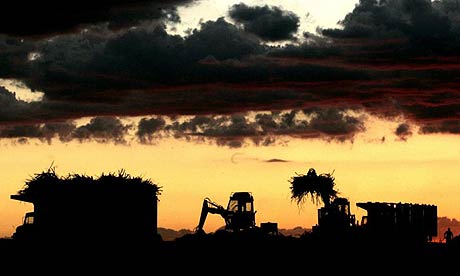EU companies have taken millions of acres of land out of food production in Africa, central America and Asia to grow biofuels for transport, according to development campaigners. The consequences of European biofuel targets, said the report by ActionAid, could be up to 100 million more hungry people, increased food prices and landlessness.
The report says the 2008 decision by EU countries to obtain 10% of all transport fuels from biofuels by 2020 is proving disastrous for poor countries. Developing countries are expected to grow nearly two-thirds of the jatropha, sugar cane and palm oil crops that are mostly used for biofuels.
"To meet the EU 10% target, the total land area directly required to grow industrial biofuels in developing countries could reach 17.5m hectares, over half the size of Italy. Additional land will also be required in developed nations, displacing food and animal feed crops onto land in new areas, often in developing countries," says the report.
Biofuels are estimated by the IMF to have been responsible for 20-30% of the global food price spike in 2008 when 125m tonnes of cereals were diverted into biofuel production. The amount of biofuels in Europe's car fuels is expected to quadruple in the next decade.
This article doesn't even get into the pollution impacts of biofuel production beyond greenhouse gas emissions (where forests are cleared to grow biofuels, leading to a spike in emissions). How about the ecological and human impacts of excessive fertilizer and pesticides use, both of which pollute soils, fresh water sources and people alike..? In the U.S., for example, excessive fertilizer use creates a huge dead zone in the Gulf of Mexico, threatening the region's fishing industry (among other problems it causes).
Ultimately, there will be a place for sustainable biofuels, and a right way, place and set of crops for getting the job done. I love systems that turn waste into fuel, be it via cellulosic ethanol or algae systems that use CO2 from power plants to grow algae. Even for these systems, however, it's critical to make sure the species being used to create the fuel aren't potential invasive species catastrophes in the making...
The bottom line is that we've really got to do a better job of thinking these things through, and then actually responding when we see the problems they cause. The fact that the U.S. is still stuck on corn ethanol after the food supply problems (and tortilla rebellion) it caused in the summer of 2008 makes us look pretty silly, if you ask me.
Read more>>
...

No comments:
Post a Comment